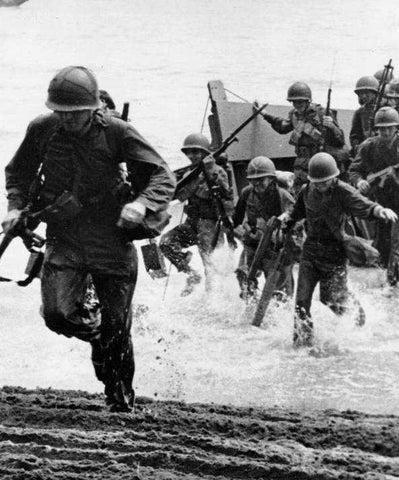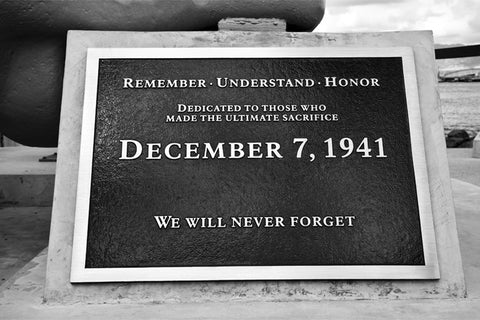THEY UNDERESTIMATED AMERICAN PERSEVERANCE
 In the days leading up to December 7th, 1941, America was a divided nation.
In the days leading up to December 7th, 1941, America was a divided nation.
Another war was raging in Europe – this time with a theater in the Pacific.
World War I was supposed to be the “war to end all war,” yet Americans were being pressured by former allies to join the fight.
Roughly 40% or more of Americans wanted to stay out of the war, according to historian Stephen Ambrose.
Americans felt divided by region and class, too. It was hard for poverty-stricken people of the Dust Bowl to find common ground with “yankees” in the northeast and on the coast.
All that changed the morning Pearl Harbor was attacked.
According to Ambrose, there were more enlistments on December 8th than any other day in American history.
Those regional schisms dissolved and more of us identified as “American,” over those provincial identities.
Our culture and economy became unified in the fight against totalitarianism, something that to this day defines the American Spirit.
Could it have been avoided altogether?
Though the attack on Pearl Harbor was a surprise, there were signs we missed. Below are several highlights from the timeline.
The Japanese began planning for the attack in January of 1941.
Just six months earlier, the United States imposed trade sanctions and then an embargo to curb Japanese aggression in Asia. Japan had invaded Chinese Manchuria in 1937, so this aggression had been going on for some time.
The same month Japan began planning the attack, Joseph C. Grew, U.S. ambassador to Japan, sent a wire to Washington informing senior officers of a Japanese plan to attack Pearl Harbor. These officials don’t believe this intel and dismiss it, believing an attack on Manila in the Philippines to be more likely.
In February of 1941, Admiral Husband E. Kimmel assumed command of the U.S. Pacific Fleet in Hawaii. Kimmel, along with Lt. Gen. Walter C. Short, commanding general of the Hawaiian Department, began hardening the islands for defense. They ask their seniors in Washington for additional men and equipment.
That spring, U.S. intelligence began decoding and intercepting Japanese communications. Many of these intelligence reports are not shared with Kimmel and Short. This includes a “bomb plot” message deciphered in September, with Japanese naval intelligence requesting a grid of targets in Pearl Harbor.
 In November, Tokyo sends a diplomat to Washington to get the U.S. to agree to its expansion in Asia. This failed, and Japan took it as a prelude to war.
In November, Tokyo sends a diplomat to Washington to get the U.S. to agree to its expansion in Asia. This failed, and Japan took it as a prelude to war.
Finally, the night before the attack, U.S. intelligence decodes a message that points to the following morning being a deadline for some kind of Japanese action. This message is delivered to Washington high command more than four hours before the attack. However, the message is not forwarded to the Hawaiian command. It finally arrives, but only after the attack has begun.
After the war, the Roberts Commission investigates what went wrong on that fateful day and finds Kimmel and Short in dereliction of their duty and solely responsible.
In more recent years, this finding has changed, and Kimmel and Short had their names cleared and ranks restored.
While we can see from this timeline that the U.S. could have done better to prepare, I want to stress that this is not pointing out American weakness or failure. Historians agree Japanese duplicity and overall Axis aggression are responsible.
But it is important to note that even our most senior officials and high-security clearance operators sometimes get it wrong. They are human. And the world is highly unpredictable.
The other thing that is important to note with this timeline is the parallels to our current foreign policy struggles, particularly with North Korea.
Shinto Japan and modern North Korea share many similarities. They are closed societies with irrational leadership. Both nations have shown a willingness to carry out devastating acts, even if doing so would be national suicide. Sanctions and embargos seem to have little effect.
Let us hope that our military and intelligence have learned that lesson.
 What the Japanese Failed to Expect
What the Japanese Failed to Expect
As we know from the outcome, the Japanese were flawed in thinking they could destroy us with a single blow.
In fact, Yamamoto Isoroku, the commander of the Japanese fleet who planned the attack, had once worked in the United States. He warned the Japanese high command of the strength of the American spirit, which they ignored.
As historian Stephen Ambrose pointed out, the Japanese "underestimated American perseverance."
Another great historical perspective of this time comes from Craig Shirley, whose book December 1941: 31 Days That Changed America and Saved the World I highly recommend if you’re interested.
Shirley noted that within hours of the attack, American attitudes about the war changed radically, as well as attitudes about the economy. We committed as a nation to become a war economy. “The war is not part of the culture; the war is the culture. Everything is viewed through the prism of the war effort,” Shirley said in an interview with U.S. News about his book.
 Shirley goes on to say that virtually everybody got up in the morning and thought “What can I do to help the war effort?” Even children were running scrap, paper, metal, rubber, and grease drives to support the effort. Nobody drove new cars for a long time because Detroit turned to manufacturing airplanes in less than a month after the attack.
Shirley goes on to say that virtually everybody got up in the morning and thought “What can I do to help the war effort?” Even children were running scrap, paper, metal, rubber, and grease drives to support the effort. Nobody drove new cars for a long time because Detroit turned to manufacturing airplanes in less than a month after the attack.
We were also unified. The president and Congress enjoyed an outpouring of support.
I sincerely hope it doesn’t take another Pearl Harbor or 9/11 to bring us closer again.
We have too much at stake and need unity now more than ever.
If I had my druthers, I’d suggest one activity to bring us together:
We could focus on spreading the message of preparedness and self-reliance.
It’s something that goes beyond politics, race or religion.
It’s what our nation was founded upon.
In times of tragedy and struggle, it’s what helps us bounce back even faster.
It’s the heart of the perseverant American spirit. It’s time we show how strong it can still beat.
 As we get closer to saying “Merry Christmas” with our loved ones, I challenge you to try and spread this message to yours. Even a few words will go a long way to preserving the liberty and security that make our nation so great.
As we get closer to saying “Merry Christmas” with our loved ones, I challenge you to try and spread this message to yours. Even a few words will go a long way to preserving the liberty and security that make our nation so great.
I hope you found this message inspiring and helpful in your preparedness journey.
In Liberty,
Grant Miller
Preparedness Advisor, MPS
P.S. To learn more about self-reliance, follow MPS on Facebook or Twitter.INSIDE ›

